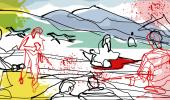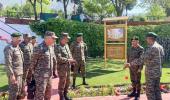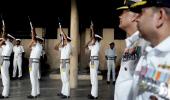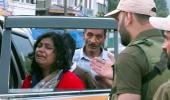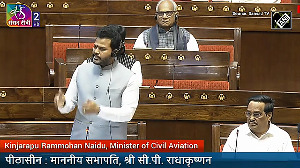Pahalgam Terrorist Attack: Dombivli families shattered in grief and grit. Demand dignity, justice and answers to unanswered questions.
Videos: Satish Bodas/Rediff
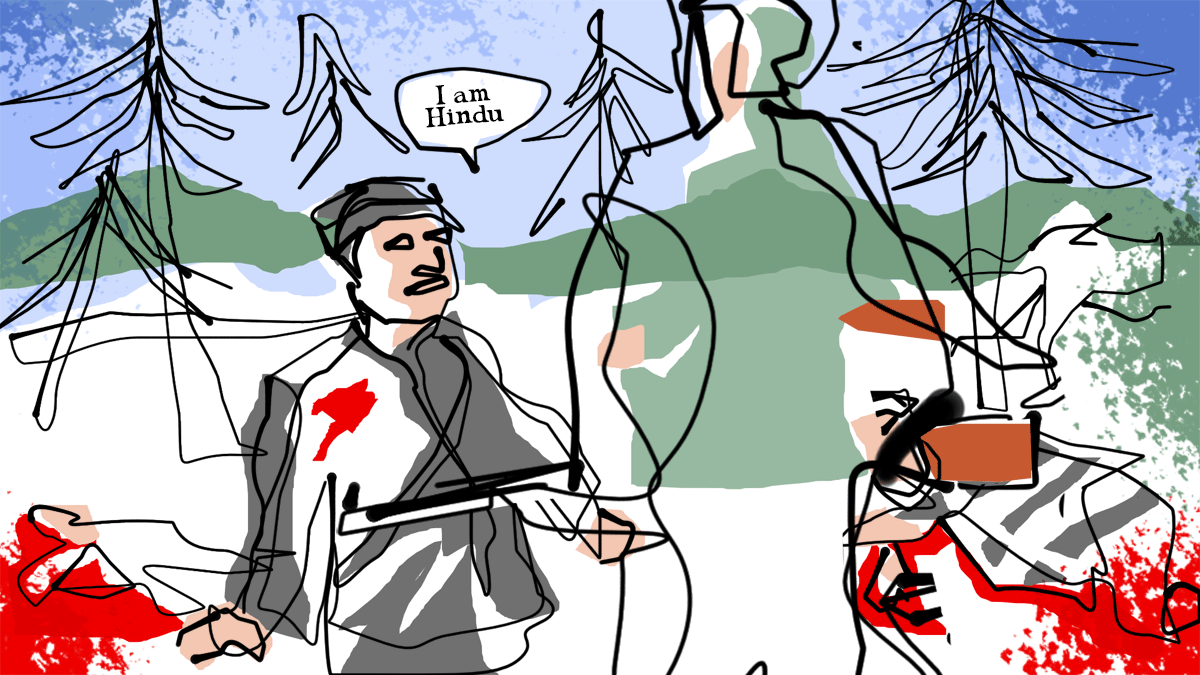
Three cousins from Dombivli, Maharashtra -- Atul Mone, Hemant Joshi, and Sanjay Lele -- were killed in the April 22 Pahalgam terrorist attack in Kashmir. The tragedy unfolded in front of their families, leaving behind grieving spouses, children, and relatives.
Among the survivors was Anushka Mone, wife of Atul, and their daughter Richa. Rediff spoke to Prasad Soman, Anushka's brother and Atul's brother-in-law, who recounted the horror faced by the families, the acts of bravery of their young ones, and talks about unanswered questions that remain days after their deaths.
Repeated requests to the people who were present at Lele's, Joshi's and Mone's homes in Dombivli West to speak with the survivors were met with a firm yet polite 'No'.
"They are devastated, they are drained, they are mentally and emotionally fatigued," says Prasad, who instead volunteers to articulate and express the feelings of the families of the Mones, Leles and Joshis with whom he has been in touch since the fateful night of April 22 when terrorists at Pahalgam slain 28 people in cold and calculated blood.
'He was not my brother-in-law, he was my brother'
"When someone is that close to your life, you don't think of them as 'in-law'," Prasad Soman begins. "He was my brother, not just my sister's husband. That's the bond we had."
He recalls the exact moment they found out about the tragedy -- on April 22, around 8:38 p.m. "We saw the news flashing on TV. At first we refused to believe it. We thought maybe it is mistaken identity, someone else with the same name. But when we saw his exact photo, his face, our hearts sank."
Prasad says the final confirmation came after they contacted helpline numbers shared by relatives and friends. "They said the three names are there -- in the list of the dead: Atul, Hemant, and Sanjay. All gone."
Remembering his brother-in-law, Prasad adds that Atul was more than just a family man -- he was a man who held people together. "He was the glue in our families. Every festival, every family crisis -- he was the one who showed up first. Now there's just a hole. Not just in our family, but in our hearts."
A bond of blood and friendship
All three -- Atul Mone (43), Hemant Joshi (44), and Sanjay Lele (50) -- were close, not just in geography but in life. "They grew up in Dombivli together. It was more than just family ties. They were brothers. They did everything together, festivals, functions, holidays. This trip too was something they had been planning for a while."
Prasad's voice trembles when he remembers what the families went through. "The wives and children were right there when the terrorists opened fire. Can you imagine watching someone you love, someone who raised you or walked with you every step, being shot in front of you?"
He says there's no training or prayer that prepares you for that. "No one can be ready to see that kind of bloodshed. A place that was supposed to be full of beauty and peace became a killing field."
A question of survival
Prasad speaks of the harrowing hours the survivors in the family had after the attack. "It took them four hours just to move from that spot. The path was not even a proper road -- it was like a trekking route, all muddy, due to rains a day ago. And they had to run, leaving behind their dead."
He adds, "Imagine being told to run for your life while your husband, your father lie bleeding on the ground. The other family members, the survivors, told the women and children -- just go. Save yourself. The Army will come."
What followed was a desperate descent through forested terrain, guided by instinct, fear, and sheer willpower.
"It wasn't just physical endurance. It was the emotional wreckage they carried. Running with the memory of what had just happened."
He said the most terrifying part wasn't the bullets -- it was the silence. "No helicopters, no soldiers, no torches in the dark. Just the sound of children crying and leaves rustling. It felt like they were abandoned."
The group's escape, he adds, was not survival -- it was sheer miracle. "We still don't know how they made it out. Maybe it was the spirit of the men they lost that carried them forward."
'He said, 'I'm Hindu.' They shot him'
Among the most chilling parts of Prasad's recollection of what his sister and niece told him about their battle for survival is what he says happened before the shooting. "The terrorists asked who among them were Hindus. And Sanjay said it. 'I am Hindu,' he said. He knew what it meant. He still said it."
Sanjay Lele's courage cost him his life.
"To say that in front of a terrorist holding a gun, knowing the next second could be your last -- it's not bravery, it's something beyond. To have the guts to say it, knowing a bullet waits -- he did not fear death," says Prasad.
Blood flowed freely on the rocky path. "Within a one-metre radius, it was just red," Prasad describes, his voice becoming moist, trying to control his tears. "Try standing next to your loved one, lying dead in blood, and still have to flee."
He adds that the terrorists were clearly segregating on the basis of religion. "They didn't hurt the women. They didn't touch the Muslims. But the Hindu men -- they shot them. It was targeted, deliberate. That's what makes it more horrific."
Prasad says such hate must be called out for what it is. "If we dilute it by saying 'unknown assailants', we're insulting the dead. This wasn't random. It was a hate crime, plain and simple."
And he says Sanjay's final words should never be forgotten. "He died affirming who he was. That should shake every conscience in this country."
Richa's strength and Harshal's courage
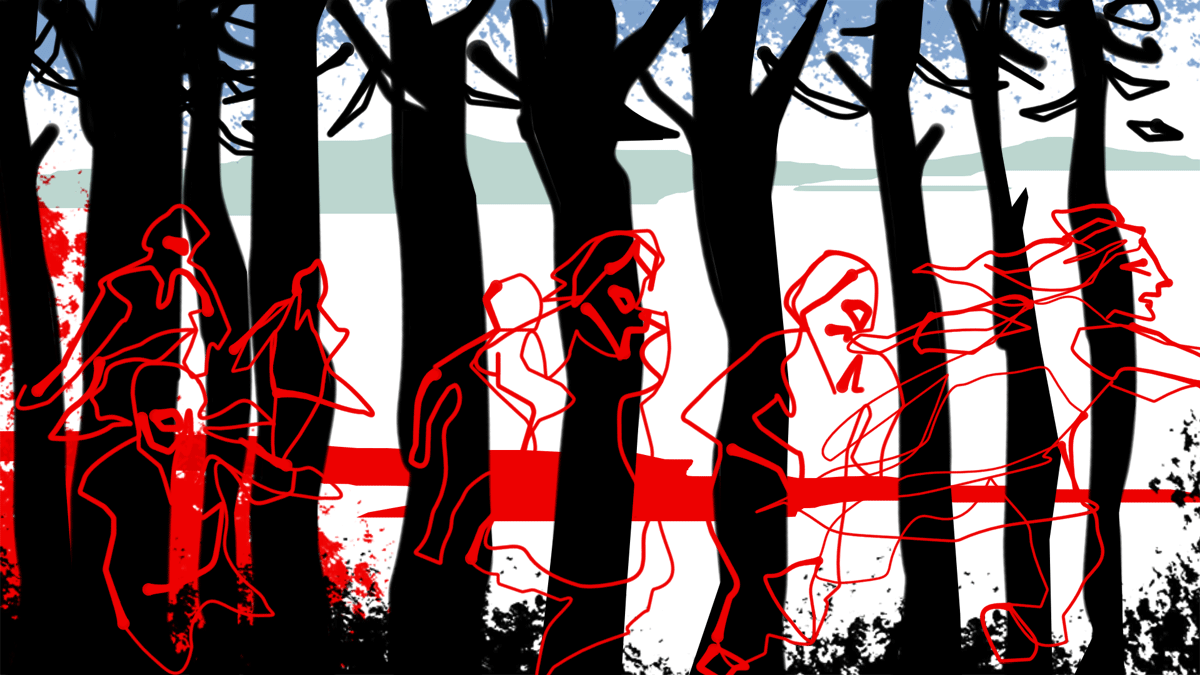
Richa, Atul and Anushka's daughter, is a school student -- she has appeared for her Class 12 exams and is awaiting results. "This happened in front of her eyes," Prasad says. "You think she can ever write off those memories in her head?"
He speaks of Harshal, 20, the son of Sanjay Lele, who supported the rest of the family in their most broken moment. "His mother is paralysed. But Harshal stood firm. He was the one helping everyone else scale down the muddy trek, even as he had just lost his father."
According to Prasad, Harshal gave others the strength to survive that night. "He wasn't crying. He was holding everyone together. That's a kind of maturity and pain no child should ever be forced to have."
Even in the aftermath, Richa kept asking where her father was knowing well what could have possibly happened to him. "No one had the heart to tell her the truth. And when she heard it, she just stood there, numb. No tears. Just disbelief."
'They came to kill the earning men'
Prasad makes an attempt to reason out why just men were singled out for death. He now sounds certain about the motive behind the killings. "They wanted to kill the Hindu men -- the ones who earned for the family. That was the aim. They didn't just want to kill tourists. They wanted to break families."
He adds, "All three -- Atul, Hemant, and Sanjay -- were the breadwinners. Their kids are still in school and college. What happens now?"
He demands answers not just from the attackers but from those who speak in their defence. "Can Pakistan support these families now? Can they offer financial help? If you say you're not involved, then prove it. Support the survivors. Don't just issue denials."
Prasad says this wasn't just a random act of terror -- it was a strategic blow. "They wanted to hurt the future of these families. And they succeeded. Now the government must ask: what have we done to protect them?"
He adds: "The terrorists killed their bodies, but the system killed their safety. It's time the State owned up to that."
Local kindness and the failure of the system
Even amid the horror, there were glimmers of kindness. Prasad speaks gratefully of Jimmy, a local Kashmiri who helped the families escape. "Jimmy helped them, guided them to safety. I think he's a retired IAS or IPS officer."
Prasad acknowledges that many Kashmiris tried to help. "It's true. A lot of locals came forward. Not everyone is like those four terrorists. Some risked their lives to save ours."
"I mean reality is reality. One cannot deny it."
But he also questions how such a large group of tourists was left unguarded. "There was a CRPF camp some distance away (from Pahalgam). Still no security? No escort? This was a known route. How can you say this was not a failure of the system?"
He points out how there were no checks or advisories. "No police at the entry point. No guide. Nothing. If this is how tourism is managed, who will visit (Kashmir) again?"
And Prasad is direct: "We don't need apologies. We need accountability. Don't just say Kashmir is safe. Show us the safety."
But the political silence weighs heavy. "Will anyone support these families financially? Not just offer sympathy on camera?" Prasad asks, directing pointed questions at public figures.
"If Pakistan says they aren't involved, will they support us instead? Are they ready to fund the futures we lost?"
'If this is India, are we safe in India?'
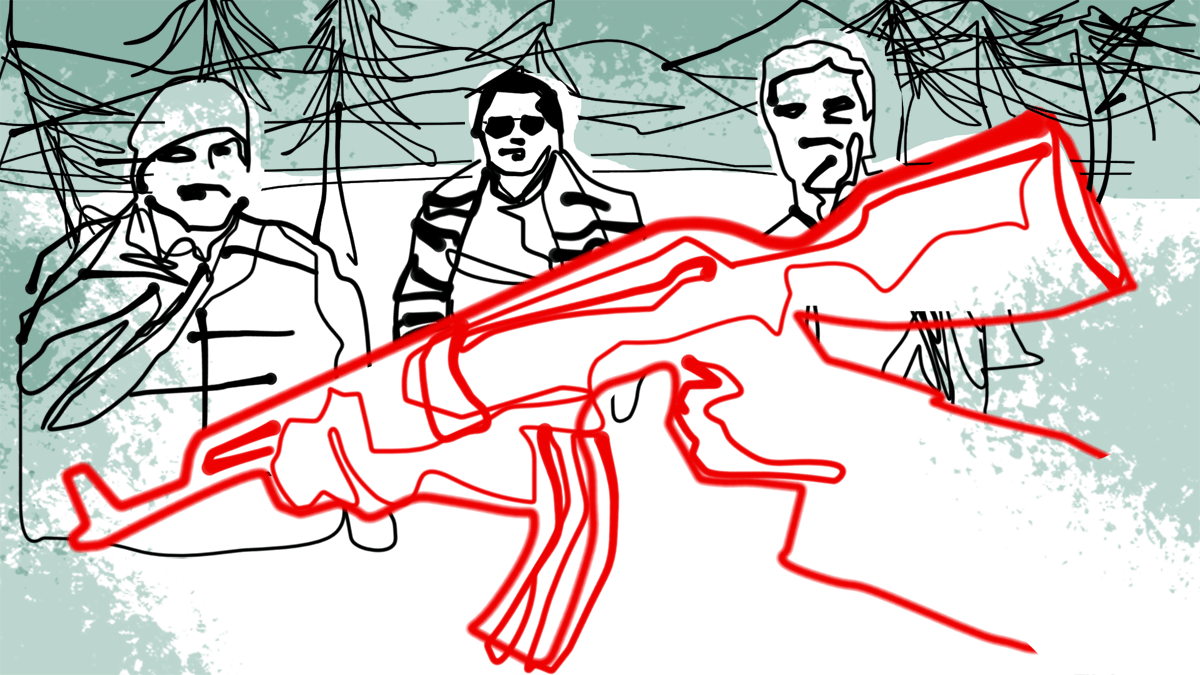
The grief quickly gives way to anger. "There were 1,000 tourists in that area. People from all over India, even abroad. One from Nepal also died. Is this what we get for trusting our own country?"
Prasad says Richa has been asking one question again and again: "If there was security, would my father still be alive?"
He points to India's global military standing -- "We are ranked fourth in the world. Still, this happened. Why?"
"If a place is known to attract pilgrims and trekkers, why isn't it protected?"
And he warns fellow Indians not to take things for granted. "Don't wait till deaths knock at your door. Open your eyes. If you're visiting sensitive areas like Kashmir, don't just assume you're safe because it's peaceful for a while."
His voice hardens. "We waited too long to ask these questions. Don't repeat that mistake."
A call for awareness and dignity
As the conversation draws to a close, Prasad shares a message he says comes from Anushka and Richa. "They want peace. They want justice. But first, they want people to remember what happened."
He adds, "Every time there's a terror attack, we move on in a few days. Until it happens again. And again. And this time it happens to your own family. Don't wait for terrorism to knock at your doors and then decide to tale action. Be vigilant. Be aware."
There's also a deeper concern about trust. "People say call the police if you see something suspicious. But when there's no security at the site, when your own are killed, who do you trust?" Still, he says, they have no choice but to believe that justice will come. "We can't give up. We have to hope."
He ends on a note of realism. "Tourism is Kashmir's lifeline. We know that. And 90% of Kashmiris are good people. But just 10% with a gun and a motive can destroy everything."
"Those who perpetrated these killings want to kill tourism in Kashmir with their cowardly terrorism. So that the youth of Kashmir have an uncertain future and they get more recruits from the unemployed youths. We should resolve to not let that happen."
"The men who died were not rich, but righteous," Prasad says. "Now the children want secure jobs, support for the survivors. The least we owe them."
"Open your eyes. If you suspect someone dangerous, inform the police," he urges. "Yes, trust is shaken. But what choice do we have? We still have to believe -- in justice, in each other."
Prasad's message is clear: don't forget those who have died -- in all the cowardly terrorist attacks that India have faced till today -- when the news cycle moves on.
